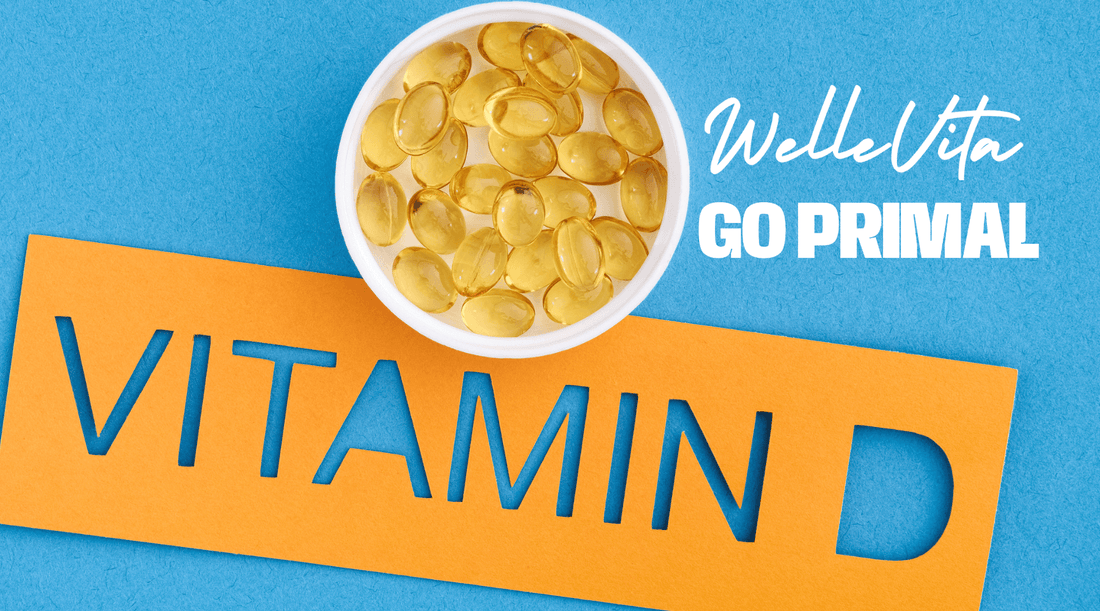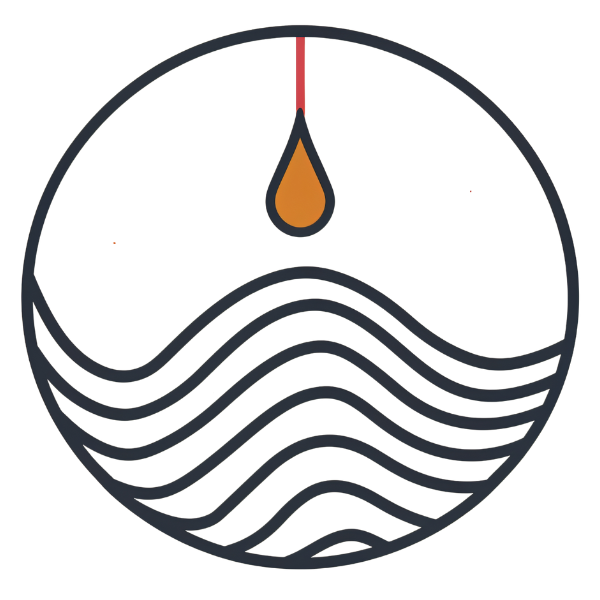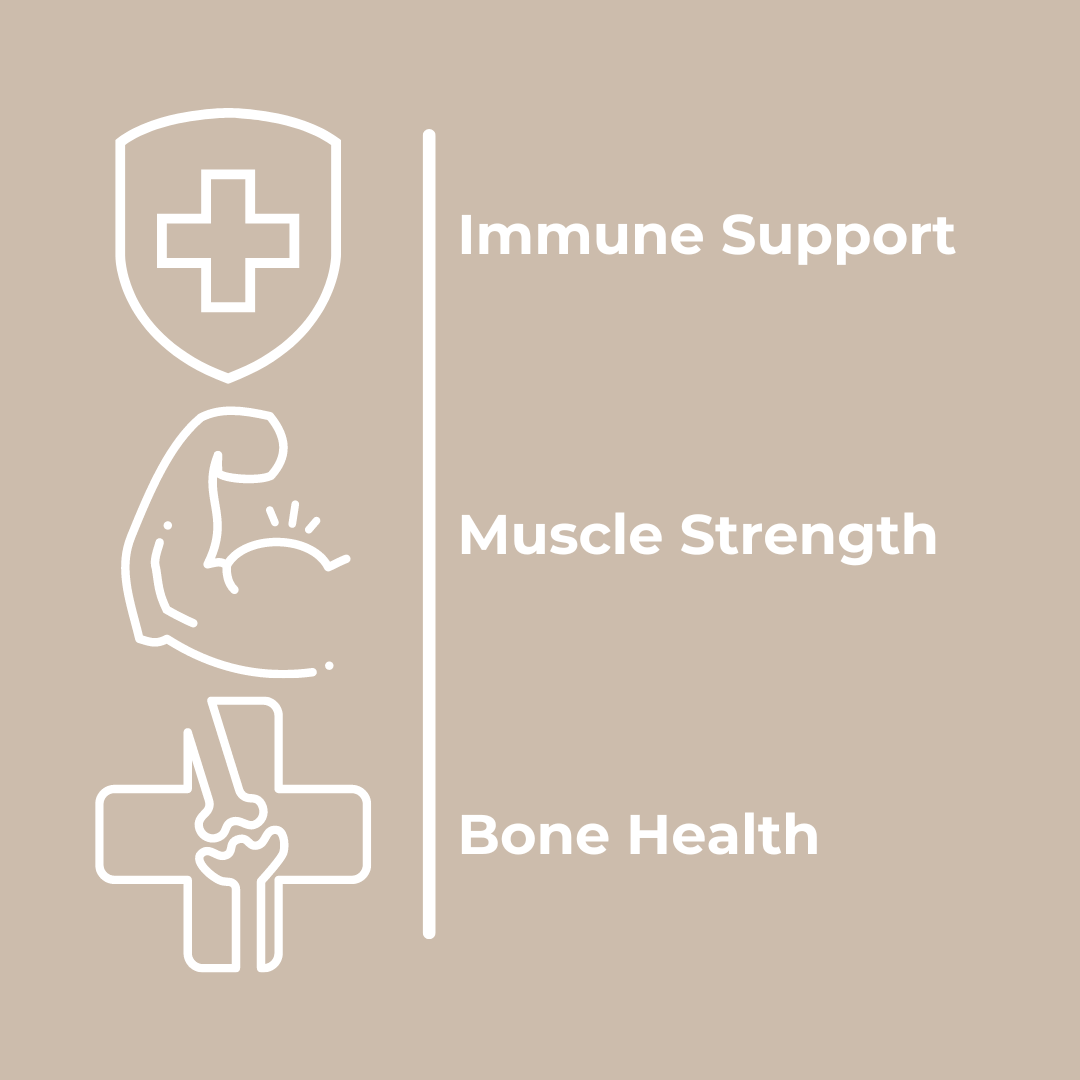
Vitamin D: The Power of Sunlight and Smart Supplementation
Share
Vitamin D is an important nutrient for our health. We call it the 'sunshine vitamin' because our bodies produce it when our skin is exposed to the sun. But what if we don't get enough sun? Let's look at the role of vitamin D and how we can get enough of it, even in the Netherlands where there is not always much sun.
Key Points About Vitamin D
- Vitamin D is necessary for strong bones and teeth
- Sunlight helps our bodies make vitamin D
- In winter there is less sunlight in the Netherlands, which means we produce less vitamin D.
- Fatty fish, eggs and fortified dairy products contain vitamin D
- Some people need extra vitamin D through supplements
- Vitamin D helps with good resistance and a better mood
- A good balance between sun, nutrition and possibly supplements is important
Why is vitamin D so important?
Vitamin D acts as a hormone in our bodies and does more than just keep our bones strong. It has many important jobs:
Important Functions of Vitamin D
- Helps absorb calcium and phosphorus for strong bones and teeth
- Supports our immune system and protects against diseases
- Provides strong muscles
- Helps to improve mood and can reduce depression
- Plays a role in the growth of cells throughout the body
- May help maintain normal blood pressure
- Is good for the heart and blood vessels
If we have too little vitamin D, we can have problems with our bones, our immune system and even our mood. We can get tired and feel sad. That is why it is important to get enough vitamin D, especially in the Netherlands where we do not have much sun all year round.
Sunlight: The Natural Source of Vitamin D
The sun is the best way to get vitamin D. When UVB rays hit our skin, our body produces vitamin D itself. This shows how cleverly our body works together with nature. But in the Netherlands we don't have enough sun all year round, which can be difficult for our health.
In the summer, it is easier to produce enough vitamin D. A short walk of 15-30 minutes in the midday sun can be enough. But in the winter, when the days are shorter and we spend more time indoors, it becomes more difficult. The sun is lower and the UVB rays are less strong. We also wear more clothes, which means that less skin is exposed to the sun. That is why many Dutch people do not get enough vitamin D in the winter. It is then important to also look at other sources of vitamin D, such as food and supplements.
Nutrition and Vitamin D
In addition to sunlight, we can also get vitamin D from our food. Although there is usually less vitamin D in food than what we can make from the sun, a varied diet does help to get enough. Some foods naturally contain vitamin D, others have extra vitamin D added:
Fatty fish
Such as salmon, mackerel and herring, rich in vitamin D
Egg yolks
Naturally contain vitamin D and other nutrients
Enriched products
Dairy, plant-based milk substitutes and some breakfast cereals
It can be difficult to get enough vitamin D from food alone, especially if you don’t like oily fish or are a vegetarian or vegan. Products with extra added vitamin D can help, but it’s important to pay close attention to the labels. That’s why many people choose to take a supplement, especially in the winter when we can make less vitamin D from the sun.
Vitamin D Supplements: A Smart Addition
If we don’t get enough vitamin D from sunlight and food, supplements can be a good solution. They help us get enough vitamin D all year round, regardless of the weather or what we eat. It’s important to take the right amount and understand why some people need extra vitamin D.
The WelleVita Vitamin D3 capsules are an example of a good supplement. They contain 2500 IU (62.5 µg) of vitamin D3 per capsule, which helps to keep your vitamin D levels up. This amount is more than what is normally recommended, but can be good for people who have too little vitamin D or need extra. It is always wise to talk to a doctor before taking a lot of vitamin D.
These capsules are useful in the winter or for people who don't go outside much. They are made from cholecalciferol, the best form of vitamin D for our body. They contain no artificial additives and are suitable for vegetarians, which makes them a good choice for many people.
Who needs extra vitamin D?
Some people are more likely to be deficient in vitamin D and may benefit from additional supplementation. It is important to understand why these groups are at greater risk so that we can take targeted action to improve their vitamin D.
Groups with increased need for vitamin D
- Elderly (65+): Produce less vitamin D and spend less time outdoors
- People with dark skin: More pigment reduces vitamin D production
- Pregnant women: Need more for the healthy growth of the baby
- People who spend little time outside: Get less sunlight
- Children up to 4 years: Grow quickly and need a lot of vitamin D
- Overweight people: Vitamin D can be 'stuck' in fat tissue
- People with certain intestinal diseases: Absorb vitamins less well
If you fall into any of these groups, it’s a good idea to talk to your doctor about vitamin D supplements. A blood test can show if you’re deficient and how much you need. Remember, everyone is different and getting personal advice from a doctor is the best way to make sure you’re getting enough vitamin D.
How Much Vitamin D Do You Need?
The amount of vitamin D you need depends on your age, skin type, lifestyle and health. In the Netherlands, the following advice applies, but remember that these are general guidelines and that individual needs may vary:
| Age group | Recommended amount | Status |
|---|---|---|
| 0-4 years | 10 µg (400 IU) | Normal |
| 4-70 years | 10 µg (400 IU) | Normal |
| 70+ years | 20 µg (800 IU) | Raised |
| Pregnant women | 10 µg (400 IU) | Normal |
| People with dark skin | 20-25 µg (800-1000 IU) | Raised |
It is important not to take too much vitamin D, as this can be bad for your health. Too much vitamin D can lead to too much calcium in your blood, which can cause problems with your kidneys and bones. Always follow the advice on the packaging or ask your doctor for advice, especially if you are considering taking a lot of vitamin D.
Balance between sunlight and protection
While sunlight is important for vitamin D, it is also important to protect your skin from too much sun. Too much sun can damage your skin, make it age faster, and increase your risk of skin cancer. It is important to find a good balance for healthy skin and enough vitamin D.
Find shade
Stay out of the sun between 11am and 3pm
Protective clothing
Wear a hat, sunglasses and clothing that covers your skin
Sunscreen
Use high protection sunscreen on exposed skin
Build up slowly
Start with short periods in the sun and build it up slowly
A short daily walk outside can help you produce enough vitamin D, without exposing your skin to too much of the sun's harmful rays. Try to spend 15-30 minutes outside each day, preferably in the morning or late afternoon when the sun is less intense. Remember that in the Netherlands the sun is different in every season, so adjust the time you spend in the sun to the time of year.
Vitamin D and your mood
Did you know that vitamin D can also affect how you feel? Especially in the dark winter months, when we get less sunlight, many people feel more depressed. This is sometimes called winter depression. The relationship between vitamin D and how we feel is complicated and interesting.
Vitamin D helps make serotonin, a chemical in our brains that is important for a good mood. Serotonin is also called the 'happiness hormone' because it can make us happy. Getting enough vitamin D can help us feel better. Read more about how vitamin D3 can improve your mood and discover how this important vitamin can help you feel better.
It is important to know that vitamin D is not a miracle cure for depression or other mood problems. If you feel down for a long time, it is always wise to see a doctor. They can help you figure out why you feel this way and find a good treatment.
Vitamin D and your immune system
A well-functioning immune system is very important to stay healthy and prevent diseases. Vitamin D plays a major role in this that is often underestimated. It helps to create and activate certain immune cells that protect our body against pathogens, such as bacteria and viruses.
Discover your Ideal Product with Our Health Test
Want to know which supplements best suit your specific health needs? Then take our health test! The Welle Vita test helps you find the ideal product that perfectly suits your lifestyle and goals. Visit our health test and receive personalized advice.




